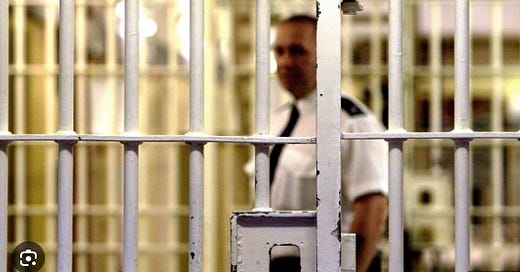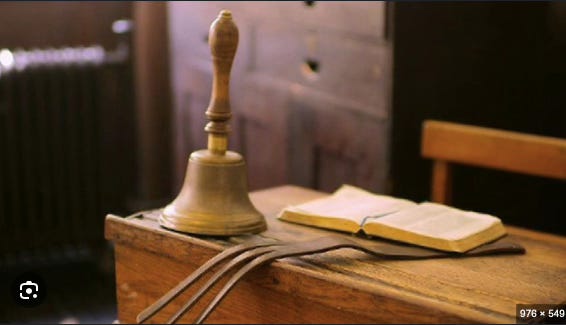With his permission, I’m publishing Ken Mathieson’s comments regarding my recent post on Scotland being a de facto colony of the UK. He describes how Scots have suffered and continue to suffer cultural suppression under UK rule and recalls his education in the 1950s when children were punished with the tawse for speaking their native Lallans. He also remembers asking his mother what the blue flag on the Town Hall was because the Saltire was only allowed to be flown on St Andrews Day.
Ken is right that liberation can only be achieved by the Scottish People - Popular Sovereignty is the key to unlocking the UK prison. More and more Scots are understanding their nation is a colony but they also need to understand their inherent power so they can exercise it to finally break free.
I agree with your assessment that Scotland is effectively an English colony. When I first saw that description in print years ago I thought it was an overstatement, but the more you witness and understand UK governance in these islands, the better the description fits Scotland’s status.
You mention economic exploitation, political control and settler occupation as evidence, but we’ve also suffered (and continue to suffer) cultural suppression (the national broadcaster consistently frames its news and current affairs output in a highly critical, and frequently fallacious, light) and the daily conflation of the UK with England is simply “othering” of our nation, its customs and its people. In doing so, it excludes Scotland from any role and relevance and involvement in UK current affairs.
Regarding cultural suppression, I recall a typical Scottish education in the 1950s: use of the Lowland Scots language in the classroom was strictly forbidden, except for Rabbie Burns’ birthday when it was undeniable if the National Bard’s work was to be recognised. A similar embargo applied in native Gaelic-speaking communities. I grew up in a busy mill-town where Lallans was the predominant language on the streets and we all grew up being bilingual – one language for the school and another for just about everything else. In some schools this was enforced by the tawse if transgressed.
In the 1950s all civic buildings flew the union flag every day with the exception of St Andrews Day when they were permitted to fly the Saltire. I remember having to ask my mother what the blue flag on the Town Hall was and being startled to find that Scotland had a national flag. In those days, the Lion Rampant, the flag of Royalty in Scotland, would be seen at sporting events, but I don’t remember the Saltire, so supporting a Scottish sports team was effectively an endorsement of Royalty, not of Scotland or its sportsmen and women.
International Law enshrines the right of colonies to leave the colonial overlordship if it can show a majority in favour of leaving. No such agreement exists in relation to Scotland and Wales within the UK and we all know how the Westminster Government plays that card.
On the other hand, thanks to the Good Friday Agreement, N Ireland has the protection of International Law and the stated right to hold a border poll which, if the majority approves, will lead to the reunification of Ireland. If the UK attempts to hinder that, it will be in breach of a hard-won International Agreement and would run the risk of incurring USA's and the EU's wrath.
That move towards Irish reunification seems increasingly secure: a recent poll in N Ireland asked the public's opinion on whether schools should be integrated or remain segregated along religious lines. 67% of the public was in favour of integration - an outcome that simply wouldn't have happened a decade ago. This shifts the pendulum of N Ireland politics further towards reunification and, if that is facilitated by Westminster, what sort of logic would deny Scotland and Wales the right to secede, too? We must keep an eye on N Ireland politics: it truly is the "San Andreas Fault of the UK" - tiny movements over a long period then a sudden and radical movement away from the old norms of The Troubles, which would afford an opportunity for Scotland to put pressure on Westminster - but we have to be ready to do that.
With the SNP currently in a deflated state, the onus now lies with the People of Scotland and Wales to take on the UK government. One legal distinction lies in the entirely contrary definitions of sovereignty in Scotland and England. In Scotland sovereignty lies with the People - it’s enshrined in Scots Law Statute from before the Union of 1707 and has been ratified in recent years in both Holyrood and Westminster. This right is therefore legally protected.
In England, sovereignty is supposedly reserved to Westminster and its ruling party, but is nowhere to be found in Statute as there is no formal UK Constitution. Instead it has come into being through the opinions of mainly 19th century parliamentarians and subsequent precedence, not through Statute. These fundamental differences can and should be exploited to ensure Scotland’s right to secede from the UK. What we need now is something akin to the Constitutional Convention which preceded devolution in the 1990s to take us forward.
Ken Mathieson






"This right is therefore legally protected."
Yes, it would ordinarily seem a most urgent matter for any nation's courts and elites to examine and deal with numerous violations to its Treaties and Acts, and its Constitution; however, in a colonial society we should not assume that assimilated native elites are primarily interested in the matter of protecting the rights of natives, or national law, above the interests of the colonizer.
I think that Scotland is in reality a Colony of England. I was born just before the war so have the usual stories to tell of the attempts to stifle the sense of my Scottishness. I joined the SNP in 1965 when it had a little office on the corner of Bath St and Elmbank St.
But I would like to find out just how many in our Scottish electorate would say Yes to that question.